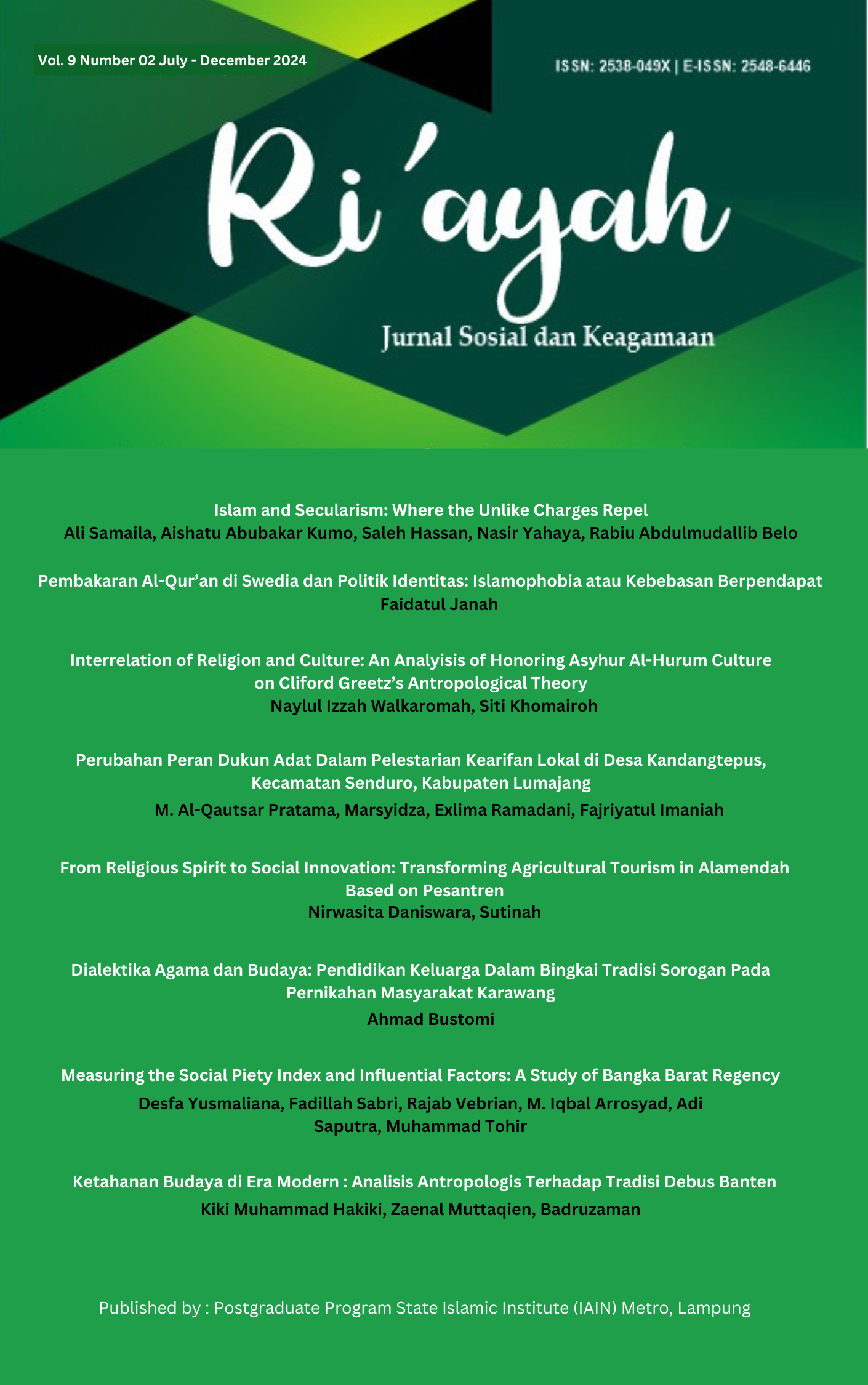From Religious Spirit to Social Innovation: Transforming Agricultural Tourism in Alamendah Based on Pesantren
DOI:
https://doi.org/10.32332/yjq8d786Keywords:
spirit, innovation, transforming, agriculture, alamendahAbstract
This study discusses the agricultural transformation in Alamendah Village, Bandung Regency, spearheaded by Pesantren Al-Ittifaq. Through the integration of religious values, social innovation, and agricultural education, this pesantren has successfully driven community-based social and economic change. This research uses a qualitative approach with a case study method to explore how local leadership, especially through the figure of Kiai Fuad, is able to change the mindset of the community from traditional agriculture to more modern strawberry cultivation. This transformation not only lifted local economic welfare, but also strengthened social solidarity through cooperative development and active community participation in collective decision-making. This research underscores the importance of social and symbolic capital in creating sustainable development based on local potential. The conclusion of this article suggests that the community-based development model implemented in Alamendah is capable of becoming an example of replication for other regions that seek to create holistic and inclusive welfare while maintaining cultural and religious values.
Downloads
References
Aisyah, S., Ilmi, M. U., Rosyid, M. A., Wulandari, E., & Akhmad, F. (2022). Kiai leadership concept in the scope of pesantren organizational culture. Tafkir: Interdisciplinary Journal of Islamic Education, 3(1), 40–59. https://doi.org/10.31538/tijie.v3i1.106
Annur, A. S., & Mappaturi, A. B. (2012). Penerapan prinsip sustainable development pada perancangan pondok pesantren enterpreneur. Journal of Islamic Architecture, 2(2).
Arifin, S., Chotib, M., Rahayu, N. W. I., Hosaini, H., & Samsudi, W. (2024). Kiai’s transformative leadership in developing an organizational culture of Islamic boarding schools: Multicase study. AL-ISHLAH: Jurnal Pendidikan, 16(2). https://doi.org/10.35445/alishlah.v16i2.5325
Bourdieu, P. (1977). Outline of a theory of practice. Cambridge University Press.
Bourdieu, P. (1984). Distinction: A social critique of the judgment of taste. Routledge & Kegan Paul.
Bowen, G. A. (2009). Document analysis as a qualitative research method. Qualitative Research Journal, 9(2), 27–40.
Brown, L. D. (1993). Social change through collective reflection with Asian nongovernmental development organizations. Human Relations, 46(2), 249–273. https://doi.org/10.1177/001872679304600206
Daniswara, N. (2024). PEMBANGUNAN WILAYAH SECARA ENDOGEN SEBAGAI UPAYA DALAM MEWUJUDKAN POTENSI DESA WISATA. Jurnal Penelitian Mahasiswa Ilmu Sosial Ekonomi Dan Bisnis Islam (SOSEBI), 4(1), 78-93. https://doi.org/10.21274/sosebi.v4i1.9235
Daniswara, N., & Habib, M. A. F. (2024). KOHESI SOSIAL DAN EKONOMI DALAM PERTANIAN PORANG DI DESA SELUR, PONOROGO. Juornal of Economics and Policy Studies, 5(1), 55-65.
Daniswara, N., & Miradj, M. (2024). INTEGRATING SHARIA ECONOMIC PRINCIPLES INTO CHOCOLATE AGRIBUSINESS: A CASE STUDY OF NGLANGGERAN VILLAGE, GUNUNGKIDUL REGENCY. An-Nisbah: Jurnal Ekonomi Syariah, 11(1), 116-130. https://doi.org/10.21274/an.v11i1.9922
Daniswara, N., & Miradj, M. (2024). INTEGRATING SHARIA ECONOMIC PRINCIPLES INTO CHOCOLATE AGRIBUSINESS: A CASE STUDY OF NGLANGGERAN VILLAGE, GUNUNGKIDUL REGENCY. An-Nisbah: Jurnal Ekonomi Syariah, 11(1), 116-130. https://doi.org/10.21274/an.v11i1.9922
Fahmi, R., Saepudin, A., Sulistiono, E., & Ramadani, R. F. (2022). Santripreneur: Education on empowerment of students through agribusiness activities. Empowerment: Jurnal Ilmiah Program Studi Pendidikan Luar Sekolah, 11(1), 28–34.
Fuad, Z. (2022). Islamic economic behavior of Kiai (Study on economic community empowerment at Pesantren Entrepreneur Al-Mawaddah Kudus). Jurnal Ilmiah Ekonomi Islam, 8(3), 2848–2858.
Hartanti, I., & Abidin, Z. (2023). Improving the quality of students of Ushuluddin Islamic Boarding School through organic vegetable agriculture training. Khidmatan, 3(1), 12–20.
Hayami, Y., & Hafid, A. (1979). Rice harvesting and welfare in rural Java. Bulletin of Indonesian Economic Studies, 15(2), 94–112. https://doi.org/10.1080/00074917912331333551
Lewis, K. V. (2024). Power, youth, and temporality: Capitalising on the symbolic in resourcing social entrepreneurship. Social Enterprise Journal. Advance online publication. https://doi.org/10.1108/SEJ-08-2023-0097
Maevawati, A., Edison, E., & Kartika, T. (2023). Dampak pengembangan desa wisata terhadap aspek ekonomi, sosial budaya dan lingkungan di Alamendah Kabupaten Bandung. Manajemen Dan Pariwisata, 2(2), 209–221.
Mariyono, D. (2024). Multicultural values: Meeting point of two forces in developing Islamic education. Quality Education for All, 1(1), 46–69. https://doi.org/10.1108/QEA-02-2024-0018
Ma’ruf, M. I., & Suratiyah, K. (2010). Analisis pertanian stroberi di Kecamatan Rancabali Kabupaten Bandung. Agro Ekonomi, 17(2).
Mubarok, J., Suprapti, A., & Sardjono, A. B. (2024). Development of spatial pattern of Darul ’Ulum Islamic Boarding School Jombang, East Java. https://doi.org/10.18860/Jia.v8i1.23639
Muhammad Fahmul Iltiham, & Rohtih, W. A. (2023). Inspiring entrepreneurial spirit to achieve economic independence for the community based on the foundation of Islamic boarding schools. MALIA (TERAKREDITASI), 15(1), 94–104. https://doi.org/10.35891/ml.v15i1.4915
Muslimah, M., Abubakar, A., & Haddade, H. (2023). Peran agribisnis dalam perekonomian dan urgensinya menurut pandangan al-Qur’an. Iqtisad: Reconstruction of Justice and Welfare for Indonesia, 10(1), 37–50.
Rahmawati, D., Setiawan, I., & Karyani, T. (2023). Pengembangan agribisnis pesantren (Studi kasus di Pondok Pesantren Al-Ittifaq–Ciwidey Kabupaten Bandung). Mimbar Agribisnis: Jurnal Pemikiran Masyarakat Ilmiah Berwawasan Agribisnis, 9(2), 1632–1652.
Rahmawati, E. (2023). State actors in agrarian conflicts. Journal of Southeast Asian Human Rights, 7(2), 263–281.
Saputro, M. E. (2012). The role of religion and agricultural technology in social transformation. Komunitas, 4(1).
Sarwani, L. A. A., Hermawanti, A. A., Ramadhanty, A., & Furqan, A. (2023). Community based tourism analysis at Alamendah tourism village.
Setiawan, M. F., Asrori, M. D., Ainurrofiq, M. R., & Febriansyah, D. D. (2023). The role of the Sunan Drajat Lamongan Islamic Boarding School education system in improving the life skills of Santri. EDU-RELIGIA: Jurnal Keagamaan Dan Pembelajarannya, 6(2), 214–223.
Sukmawati, S. (2023). Peran Pondok Pesantren Jabal Hikmah dalam perubahan sosial masyarakat Desa Suwangi Timur Kecamatan Sakra Kabupaten Lombok Timur. MANAZHIM, 5(2), 817–835. https://doi.org/10.36088/manazhim.v5i2.3490
Timmer, C. P. (2004). The road to pro-poor growth: The Indonesian experience in regional perspective. Bulletin of Indonesian Economic Studies, 40(2), 177–207. https://doi.org/10.1080/0007491042000205277
Trickett, E. J. (2011). Community-based participatory research as worldview or instrumental strategy: Is it lost in translation(al) research? American Journal of Public Health, 101(8), 1353–1355. https://doi.org/10.2105/AJPH.2011.300124
Undurraga, J. T., & Pokorny, B. (2024). Rural development opportunities through contextual interventions: A systematic review. Environment, Development and Sustainability. Advance online publication. https://doi.org/10.1007/s10668-024-05245-6
White, B. (1979). Political aspects of poverty, income distribution and their measurement: Some examples from rural Java. Development and Change, 10(1), 91–114. https://doi.org/10.1111/j.1467-7660.1979.tb00032.x
Yin, R. K. (2018). Case study research and applications: Design and methods. SAGE Publications.
Zhang, F., Xiao, F., & Yu, P. (2024). A model of sustainable development in economic, social, and environmental aspects: The role of social capital in China. Environmental Research Communications, 6(4). https://doi.org/10.1088/2515-7620/ad37a8







